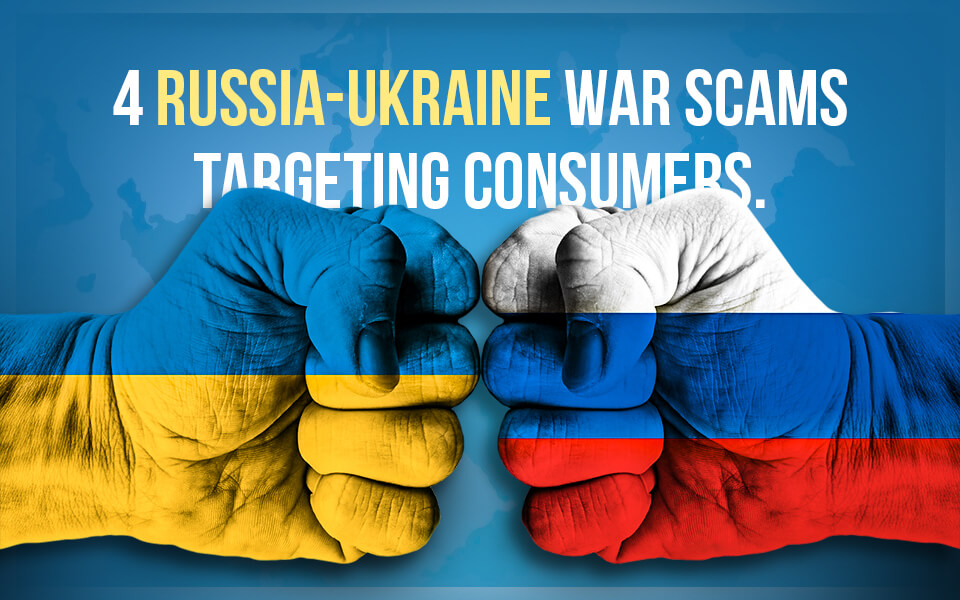Military conflict between two countries is always disheartening, what is beyond belief is when scammers take advantage of such crises to make a profit.
Make sure to research charities and keep an eye out for these frauds if you want to aid the people of Ukraine.
There are numerous worthy causes and organizations taking donations if you want to aid those affected by the conflict in Ukraine. However, experts caution that there are also a lot of frauds associated with Ukraine that prey on consumers and cover fundraising, social media, cryptocurrencies, and even dating.
Here is a look at a few frauds trying to capitalize on Russia’s invasion of Ukraine.
Fundraising Scams
The fundraising industry is a common target for scammers looking to profit from the crisis in Ukraine. Scammers can use whatever is going on in society as an opportunity to con people.
Observants have asserted that a reputable charity may still phone you even if you have registered for the federal Do Not Call List. According to them, the issue is that you can never be sure who is calling you on the phone, which means you can get a call from a phony charity or a con artist posing as a real organization.
Our experts claim that the best defense against being conned by a fraudulent organization is politely declining to donate the phone. An actual charity won’t be out of luck as a result. So instead, end the call and start the payment yourself after investigating the organization on its website if you like how it sounds.
If you want to help the people of Ukraine, you can use Charity Navigator to find top-rated nonprofits. We’ve curated a list of few of them: GlobalGiving, Save the Children, and the Center for Disaster Philanthropy.
Of course, phony fundraisers don’t only call, email, or text individuals. They created phony charity websites as well.
According to reports, thousands of domains relating to Ukraine were established soon after the crisis starte. Some of these might represent sincere efforts to raise money. Many undoubtedly aren’t.
According to our recovery experts, donating to genuine charities rather than any self-proclaimed donation websites is the easiest method to evade scammers.
Here we’ve listed a few organizations and issues that individuals may want to give to:
- The National Bank of Ukraine set up a special account to raise money for the nation’s armed forces.
- Come Back Alive is a company that has been operating since 2014 that aids Ukraine’s military forces.
- Razom for Ukraine is a company that offers Ukraine essential medical products.
- One of the best newspapers in Ukraine and one that is still published, is the Kyiv Independent.
Dating
As per our study, romantic frauds, which have always been an issue, sharply intensified during the pandemic.
Now, con artists will be active on dating websites and social media, using knowledge of psychology that (Sigmund) Freud would be envious of to trick unwary people into thinking they have found true love with a Ukrainian who, soon after the relationship begins, has an urgent need for money to be sent to them.
This does not mean you shouldn’t communicate with a Ukrainian person you meet on a dating website. A real person may be attempting to connect. But generally speaking, don’t send them money even if you think you know someone online.
Cryptocurrency
It is not surprising that there are allegations of cryptocurrency scams in Ukraine, given that cryptocurrency fraud has been increasing for years. The second-riskiest form of fraud in 2021 was cryptocurrency schemes, up from the seventh riskiest in 2020.
At the fraud protection firm, a trust and safety architect, reports that she and her coworkers have observed con artists acting as Ukrainians in need of charity, seeking payment in cryptocurrencies, and then pocketing the money.
According to her, another type of scam we are witnessing is con artists disguising themselves as cryptocurrency exchanges and claiming to be gathering donations in the form of bitcoin for the people of Ukraine.
However, according to our experts, using cryptocurrency to donate to charity is not necessarily bad. They claim that many trustworthy charities have been requesting cryptocurrency donations to aid the Ukrainian people devastated by the Russian invasion. Even the Ukrainian government has been asking for cryptocurrency donations to help fund the purchase of military hardware, medical supplies, and other essential items.
Bitcoin, Ethereum, Tether, Litecoin, Dogecoin, and a variety of other cryptocurrencies can be donated to Kuna, the biggest cryptocurrency exchange in Ukraine. According to reports, the Ukrainian government has received cryptocurrency donations totalling millions of dollars.
But con artists are undoubtedly hiding. Weisman claims that in the early stages of the conflict, con artists acting as Ukrainian officials created a fake cryptocurrency called Peaceful World and sold it on the Uniswap network. Before the counterfeit coin was exposed as a fraud, more than $50 million in donations were made.
The demand that you make your donation in cryptocurrency only raises a large red flag for customers as they evaluate the reliability of a Ukrainian rescue effort. Legitimate donation websites will allow users to pay with more widely used currencies and payment methods, such as credit cards. Importantly, because cryptocurrency transactions are irreversible, the donor has few options for getting a refund. If you want to donate cryptocurrency, make sure you’ve done your homework to verify the receiver.
Social Media
Scammers can discover you on social media by using the invasion of Ukraine as a pretext. That shouldn’t come as a surprise. However, they have remarkable methods of fooling you.
It’s common knowledge to be cautious of strange and unfamiliar emails and texts, particularly those that beg you to click on a link. Still, it can be more challenging while using social media. Never click on links from sources you haven’t checked out to be reliable. TikTok, in particular, has been widely used during the conflict. Even though many of the posts are genuine, others are false, such as one that featured a street lined with automobiles as screaming and shooting could be heard in the background. In addition, the contribution request was made in a video that claimed to be from Ukraine. However, if you watched the footage closely, you would see that the automobiles’ license plates were from the UK.
Experts continue, saying that the best course of action is to limit your sources to reputable, legitimate news outlets with which you are already familiar rather than relying on social media, which may not be trustworthy and may only be an attempt to trick you into clicking on malicious links.
We would advise being cautious while using links and QR codes that lead to private Venmo accounts of Ukrainians in need.
Some actual Ukrainians may be engaging in this, but Venmo theft is one of the largest frauds to have emerged since Russia invaded Ukraine.
Therefore, it is best to avoid sending money to anyone before doing a complete background check on them using Venmo.
We suggest that the best way for people to prevent being conned is to avoid making donations to any organizations or people through third-party payment apps like Venmo unless they are certain that they know the people or the organizations in question independently from the online appeals for assistance.




